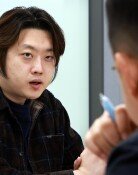Three Politicians Involved In Cho Dong-man Bribery Scandal Were Not Indicted
Three Politicians Involved In Cho Dong-man Bribery Scandal Were Not Indicted
Posted November. 15, 2004 23:09,
The Seoul District Public Prosecutors Office revealed the outcomes of its investigation into politicians who took money from Cho Dong-man, ex-vice chairman of the Hansol Group, yesterday.
The prosecution, among politicians who took money from Cho, indicted only Lee Won-hyung, ex-chairman of the Ombudsmans office of Korea, on suspicion of taking bribes in accordance with a law stipulating heavy punishment for particular crimes.
The prosecution finished its investigation without prosecuting former lawmaker Kim Joong-kwon, who admitted accepting 700 million from Cho, Rep. Kim Han-gil of the ruling Uri Party, who admitted his acceptance of 100 million won from Cho, and Yu Jong-geun, former governor of Jeonbuk province to whom Cho claimed to have given 200 million won, saying the reason being that the legal prescription of punishment for their violations has expired. The legal prescription is three years in this case.
Lee, ex-chairman of the Ombudsmans Office of Korea, took 320,000 shares of stock from Hansol Iglobe under another name in May 2002 and accepted a total of about 80 million won eight times from March to October by naming it as remuneration for his advisory role on the companys management board. In compensation, Hansol Iglobe asked Lee to help continue their exclusive contract with Powercomm, an affiliate of the Korea Electronic Power Corporation.
Former lawmaker Kim Joong-kwon was revealed to have accepted 200 million won from March to April ahead of the 2000 general election, 200 million won in December 2000, and 300 million won in May 2001 when he served as a chairman of the Millennium Democratic Party (MDP). The prosecution said that Kim stated he spent the money taking care of activities as the chairman of MDP and supporting the presidential election at that time.
Kim Han-gil of the ruling Uri Party has also admitted that he accepted 100 million won from Cho in May 2000 when he served as a head of the planning committee for the presidential election to cover the cost of a poll.
Yoo Jong-geun, former governor of Jeonbuk province, is suspected of accepting 200 million won from Cho in early 1998. At that time, Cho was under investigation on suspicion of involvement in bribery in getting permission for PCS manufacturing rights. Cho stated that he gave the bribe and asked Yu to exercise power in nullifying his suspicion. However, the prosecution said, Yu denied Chos statements.
Regarding the indictments of a few politicians among those who accepted money from Cho, some evaluate it is a proper application of law, but some criticize that kind prosecutors gave acquittals to politicians.
Even though it was confirmed that former lawmaker Kim took as much as 700 million won from Cho, the prosecution concluded, without precisely examining the nature and the purpose of the money, that 700 million won is just political fund. According to the Political Funds Law, the legal prescription is just three years. But if the money is regarded as a bribe, the legal prescription is at least seven years.
The prosecutions sources said, Considering Lee served as a chairman of MDP when he took money from Cho, it is inappropriate to treat this money as a bribe and we were not able to find any evidence that Cho gave money expecting certain favors.
Moreover, the prosecution invoked Article Two, Section Two of the law of heavy punishment on particular crimes, which is applied when one accepts bribes from 10 million won to less than 50 million won, rather than Article One, Section One, which is applied when one accepts bribes of more than 50 million won. Lee Won-hyung took 80 million won. While those who accept more than 50 million won face more than 10 years in prison, ones who accept less than 50 million face more than five years in prison.
Jin-Young Hwang buddy@donga.com






![[단독]주한미군 패트리엇 ‘오산기지’ 이동… 수송기도 배치](https://dimg.donga.com/c/138/175/90/1/wps/NEWS/IMAGE/2026/03/05/133474743.1.jpg)
